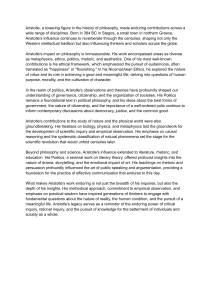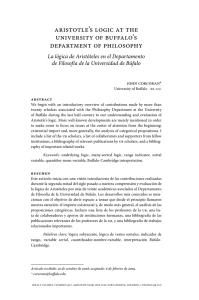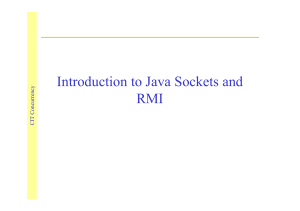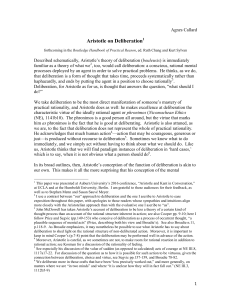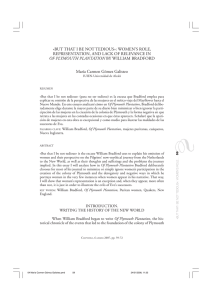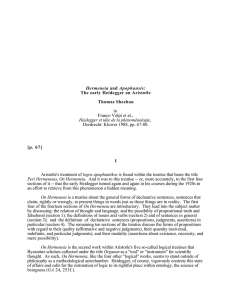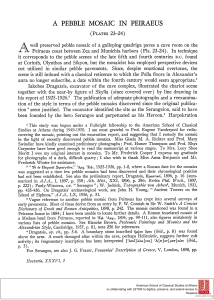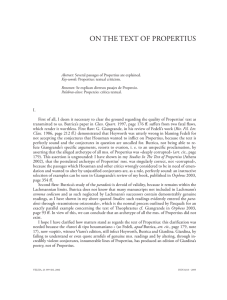Filósofos o Viajeros: El Pensamiento como Extravío
Anuncio
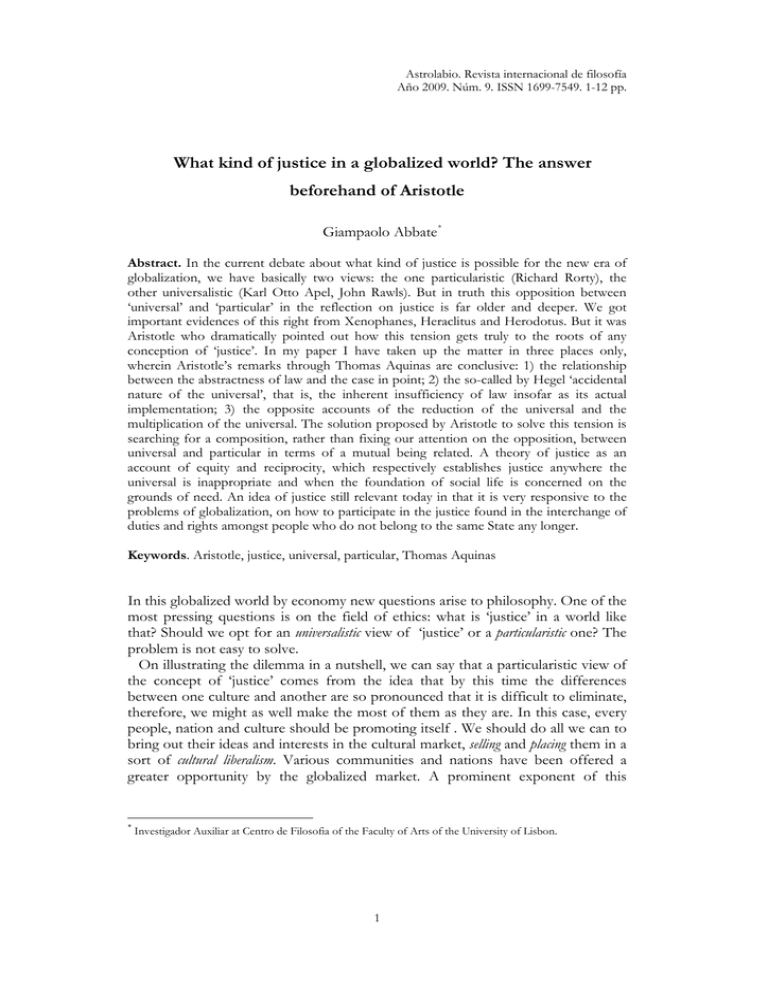
Astrolabio. Revista internacional de filosofía Año 2009. Núm. 9. ISSN 1699-7549. 1-12 pp. What kind of justice in a globalized world? The answer beforehand of Aristotle Giampaolo Abbate * Abstract. In the current debate about what kind of justice is possible for the new era of globalization, we have basically two views: the one particularistic (Richard Rorty), the other universalistic (Karl Otto Apel, John Rawls). But in truth this opposition between ‘universal’ and ‘particular’ in the reflection on justice is far older and deeper. We got important evidences of this right from Xenophanes, Heraclitus and Herodotus. But it was Aristotle who dramatically pointed out how this tension gets truly to the roots of any conception of ‘justice’. In my paper I have taken up the matter in three places only, wherein Aristotle’s remarks through Thomas Aquinas are conclusive: 1) the relationship between the abstractness of law and the case in point; 2) the so-called by Hegel ‘accidental nature of the universal’, that is, the inherent insufficiency of law insofar as its actual implementation; 3) the opposite accounts of the reduction of the universal and the multiplication of the universal. The solution proposed by Aristotle to solve this tension is searching for a composition, rather than fixing our attention on the opposition, between universal and particular in terms of a mutual being related. A theory of justice as an account of equity and reciprocity, which respectively establishes justice anywhere the universal is inappropriate and when the foundation of social life is concerned on the grounds of need. An idea of justice still relevant today in that it is very responsive to the problems of globalization, on how to participate in the justice found in the interchange of duties and rights amongst people who do not belong to the same State any longer. Keywords. Aristotle, justice, universal, particular, Thomas Aquinas In this globalized world by economy new questions arise to philosophy. One of the most pressing questions is on the field of ethics: what is ‘justice’ in a world like that? Should we opt for an universalistic view of ‘justice’ or a particularistic one? The problem is not easy to solve. On illustrating the dilemma in a nutshell, we can say that a particularistic view of the concept of ‘justice’ comes from the idea that by this time the differences between one culture and another are so pronounced that it is difficult to eliminate, therefore, we might as well make the most of them as they are. In this case, every people, nation and culture should be promoting itself . We should do all we can to bring out their ideas and interests in the cultural market, selling and placing them in a sort of cultural liberalism. Various communities and nations have been offered a greater opportunity by the globalized market. A prominent exponent of this * Investigador Auxiliar at Centro de Filosofia of the Faculty of Arts of the University of Lisbon. 1 Astrolabio. Revista internacional de filosofía Año 2009. Núm. 9. ISSN 1699-7549. 1-12 pp. current is Richard Rorty who, in dialogue with Nijogi Anindita Balslev, 1 opts for a hermeneutics-style choice, by which certain meanings vary from one society to another. He says that it is not important to rationally - universally - agree on what is ‘justice’, but foster a particularistic view based on the sentiment. According the universalistic view, we would come to an agreement among cultures, countries and religions on what is ‘justice’ (a sort of a common ethos) to be understood each other in a global village. Of course, one of the most eminent proponents of this view is Karl Otto Apel. He tries, actually, to develop a universal ethics just in response to globalization, 2 but his theory also resembles John Rawls’ (the early Rawls’ theory) 3 and Habermas’. 4 These supporters of the universalistic view criticize any kind of particularism, since they consider this making reference to local views of ‘justice’, endowed with their own cultures or traditions, may support unfair behaviours owing to choices of self-interest. Liberal views for example would turn into «oppression and dominion», as has been so far. Therefore, it is necessary to agree on universal ethical principles, based on a minimally formalized consensus, if we are to avoid such deviations and distortions. In truth, this conflict is far older and deeper. The strongest evidence for this is that from the beginning the concept of ‘law’ is conceived in a universal form: «all law is universal». 5 But together with the universal form in the Western tradition the particular one was being thought: once the idea of ‘justice’ is established as universal justice, it is also particular justice. As it stands, justice in so far as is universal, can but be particular too. In the following, I will only mention three places where the connection between universal and particular manifests itself in a way that cannot be set aside. The first of these three places is the relationship between the universal rule and the case in point, corresponding to the well-known distinction in law studies between the abstractness and generality of rules referring to the standard and factual behaviours to which rules should apply. As Aristotle writes: 1 Cultural Otherness: Correspondence with Richard Rorty, Indian Institute of Advanced Study, Shimla, 1991, reprinted Scholar's Press, Atlanta 1999. 2 Particularly, pay attention to Das Problem der Gerechtigkeit in einer multikulturellen Gesellschaft, in R. FornetBetancourt (hrsg. v.), Armut im Spannungsfeld zwischen Globalisierung und dem Recht auf eigene Kultur, AugustinusBuchhandlung, Aachen 1997, pp. 106-130; Das Problem des Multikulturalismus in der Sicht der Diskursethik, in Portuguese translation, Modernidade e multiculturalismo do ponto de vista da etica do discurso, «Ética e Filosofia Politica», 2/1 (1997), pp. 5-28. 3 A Theory of Justice, Harvard University Press, Oxford, 1971; The Sense of Justice, in: Collected Papers, ed. by S. Freeman, Harvard University Press, Oxford, 1999, p. 96-116 In this regard see: Sonia T. Felipe, Rawls: uma teoria ético-política da justice, in M.A. Olivera, (Org.) Correntes Fundamentais da Ética Contemporânea, Vozes, Petrópolis, 2000, pp. 133-162; Rawls’ legacy: a limited possibility of a non-speciesist environmental justice, «Florianópolis» v. 4, n. 1 (2005), pp. 23-37. 4 In texts that by now have become part of the history of contemporary philosophy as Moralbewusstsein und kommunikatives Handeln, Suhrkamp, Frankfurt a. M., 1983; Erläuterungen zur Diskursethik, Suhrkamp, Frankfurt a. M., 1991. In this regard, see: A questão da moralidade: da razão prática de Kant à ética discursiva de Habermas, «Tempo Social», Rev. Sociol. USP, São Paulo, 1(2), 1999, pp. 7-44 e Marco A. Sousa Alves, Habermas e os desafios de uma sociedade multicultural, «Intuitio», Vol. 2, No. 1 (2009), pp. 124-139. 5 Nichomachean Ethics, 1137b 13. From Aristotle. Nichomachean Ethics, translation and edited by R. Crisp, Cambridge University Press, 2000, 2004, p. 100. 2 Astrolabio. Revista internacional de filosofía Año 2009. Núm. 9. ISSN 1699-7549. 1-12 pp. Each type of what is just and legal stands as a universal in relation to particulars; for the actions done in virtue of them are many, but each of them is a single entity, since it is a universal. 6 Thomas Aquinas further explains it is important to stress the ontological and axiological structure of the human law that cannot overcome such a insufficiency: […] lex humana dicitur aliqua permittere, non quasi ea approbans, sed quasi ea dirigere non potens. Multa autem diriguntur lege divina quae dirigi non possunt lege humana, plura enim subduntur causae superiori quam inferiori. Unde hoc ipsum quod lex humana non se intromittat de his quae dirigere non potest, ex ordine legis aeternae provenit. Secus autem esset si approbaret ea quae lex aeterna reprobat. Unde ex hoc non habetur quod lex humana non derivetur a lege aeterna, sed quod non perfecte eam assequi possit. 7 Because [...] quod nullius hominis sapientia tanta est ut possit omnes singulares casus excogitare, et ideo non potest sufficienter per verba sua exprimere ea quae conveniunt ad finem intentum. Et si posset legislator omnes casus considerare, non oporteret ut omnes exprimeret, propter confusionem vitandam, sed legem ferre deberet secundum ea quae in pluribus accidunt. 8 The second of the three places where the connection between the universal and the particular is being displayed in a structural way is less obvious and inescapable than the first, but even more radical. It could be called ‘the accidental nature of the universal’. This accidental nature is related to what Hegel called «das rein Positive der Gesetze», i.e. an element of arbitrariness that necessarily accompanies the universal norm with its implementation. Well does explain Hegel: In dieser Zuspitzung des Allgemeinen, nicht nur zum Besonderen, sondern zur Vereinzelung, d. i. zur unmittelbaren Anwendung, ist es vornehmlich, wo das rein Positive der Gesetze liegt. Es läßt sich nicht vernünftig bestimmen noch durch die Anwendung einer aus dem Begriffe herkommenden Bestimmtheit entscheiden, ob für ein Vergehen eine Leibesstrafe von vierzig Streichen oder von vierzig weniger eins, noch ob eine Geldstrafe von fünf Talern oder aber auch von vier Talern und dreiundzwanzig usf. Groschen, noch ob eine Gefängnisstrafe von einem Jahre oder von dreihundertvier undsechszig usf. [Tagen] oder von einem Jahre und einem, zwei oder drei Tagen das Geredete Ibidem, 1135a 5-8. Crisp, cit., p. 94. S. Thomae Aquinatis Summa theologiae, Ed. Petrus Caramello, Marietti, Taurini, 1952, Ia-IIae, q. 93, a. 3, ad 3. 8 Ibidem, Ia-IIae, q. 96, a. 6, ad 3. We have here the use of an epistemological argument similar to that used by Friedrich A. von Hayek in highlighting the limits of legislative activity (i.e. the Hayekian thesis): every human legislator necessarily acts on the basis of a knowledge insufficient to achieve an appropriate regulatory regime, as it were, to the multiplicity of the situations and their evolution over time. 6 7 3 Astrolabio. Revista internacional de filosofía Año 2009. Núm. 9. ISSN 1699-7549. 1-12 pp. sei. Und doch ist schon ein Streich zuviel, ein Taler oder ein Groschen, eine Woche, ein Tag Gefängnis zuviel oder zuwenig eine Ungerechtigkeit. 9 Similarly, Aristotle was already writing: What is legal is what originally makes no difference whether it takes one form or another, but does matter when people have adopted it; for example, that the ransom for a prisoner be one mina, or that a goat be sacrificed and not two sheep. 10 Finally, the third of three places wherein the connection between the universal and the particular is being manifested in the idea of ‘justice’ has two opposite accounts: the reduction of the universal and the multiplication of the universal. In reducing the universal, the universality of justice is reduced to a special case of a further and higher universality: justice in the strictest sense, that in dealing with law and politics, is reduced to virtus specialis, 11 that is, a virtue as a part of a virtus generalis, 12 o iustitia legalis, 13 which is, on the contrary, the wholeness of virtue, that is, the virtue in its totality, “hóle areté”. 14 In the multiplication of the universal, the universality of justice is multiplied in an open series of special universalities, so that, as Thomas shows, are imposed on people according to their condition («secundum eorum conditionem» 15 ), for example Ad tertium dicendum quod omnes aliae diversitates personarum quae sunt in civitate, habent immediatam relationem ad communitatem civitatis et ad principem ipsius. Et ideo ad eos est iustum secundum perfectam rationem iustitiae. Distinguitur tamen istud iustum secundum diversa officia. Unde et dicitur ius militare vel ius magistratuum aut sacerdotum, non propter defectum a simpliciter iusto, sicut dicitur ius paternum et dominativum, sed propter hoc quod unicuique conditioni personae secundum proprium officium aliquid proprium debetur. 16 As we have seen, universal and particular are correlated according to different meanings. The correlation manifests itself as either a opposition or a composition G.W.F. Hegel, Gesammelte Werke, in Verbindung mit der deutschen Forschungsgemeinschaft hrsg. von der Nordrhein-Westfälichen Akademie der Wissenschaften, Felix Meiner Verlag, Hamburg,, 1968, Bd. XIV,1, Grundlinien der Philosophie des Rechts, § 214. Translated by S.W Dyde, Batoche Books, Kitchener, 2001, as follows: «To whittle the universal down not only to the particular but to the individual case is the chief function of the purely positive in law. It cannot, for example, be determined by reason, or decided by any phase of the conception itself, whether forty lashes or thirty-nine, a fine of four dollars or three dollars and ninety-nine cents, imprisonment for a year or three hundred and sixty-four or three hundred and sixty-six days, be the just punishment for a crime. And vet a lash, a cent, or a day too much or too little is an injustice». 10 Nichomachean Ethics, V, 7, 1134b 20-24. Crisp, cit., p. 93. 11 Summa Theologiae, IIa-IIae, q. 58, a. 5, ad 1. 12 Ibidem IIa-IIae, q. 58, a. 5, ad 1. 13 Ibidem, IIa-IIae, q. 58, a. 5. 14 Nichomachean Ethics, 1130a 9. 15 Summa theologiae, IIa-IIae, q. 96, a. 2, co. 16 Ibidem, IIa-IIae, q. 57, a. 4, ad 3. 9 4 Astrolabio. Revista internacional de filosofía Año 2009. Núm. 9. ISSN 1699-7549. 1-12 pp. of the two usual outcomes from the philosophical reflection on it. But neither the opposition nor the composition eliminates the tension, given the structural being correlated of universal to particular, and vice versa. Obviously, the opposition of universal and particular, has two accounts: either the opposition of universal and particular focuses on the first (universal) or the opposition of universal and particular focuses on the second (particular). The opposition of universal and particular focusing on universal was already fully defined by one of the greatest masters of Western thought: Xenophanes of Colophon. Xenophanes opposed the universality of God, who is «one god, is the greatest among gods and men, not all like mortals in body or in thought», 17 and «[…] whole he sees, whole he thinks, and whole he hears», 18 to the particular pictures of him - consequently, false to Xenophanes - made by the several peoples. Xenophanes writes in highly celebrated lines: Ethiopians say that their gods are snub-nosed and black; Thracians that there are blue-eyed and red-haired. 19 […] [And again:] if the horses or oxen or lions had hands or could draw with their hand and accomplish such works as men, horses would draw the figures of the gods as similar to horses, and the oxen as similar to oxen, and they would make the bodies of the sort which each of them had. 20 The opposition of universal and particular that focuses on the particular, rather than the universal, is a very ancient event in the western history of the idea of ‘justice’, whose most recent episode is perhaps the vindication of this fact as a value. It is a very old because it appears both in the first thought of the polis and in their early ethnological considerations. Heraclitus said that the people should fight as much for the law as for the walls of the town, 21 given a strong connection between them. Herodotus then offers a first example of a fundamental respect for ethnological differences, but at the same time he overshadows the universal, to such an extent to be ahead of time as a representative of the nowadays’ cultural relativism. 22 Very important is the moment of the Darius’ interrogation to certain Indians, of the race called Callatians, and the Greeks on their habits of eating or, alternatively, cremating their dead fathers, being the first custom awful and disgusting to the Greeks, whereas the second repugnant to the Indians. 23 Even on the basis of the Darius’ test, Herodotus fr. DK 23 fr. DK 24 19 fr. DK 16 20 fr. DK 15. From Xenophanes of Colophon Fragments, A text and translation with a commentary by J.H. Lesher, University of Toronto Press Inc., Toronto, 1992. 21 fr. DK 44 22 Especially, see E. Powell, The history of Herodotus, Cambridge University Press, 1939; F. Hartog, Le miroir d'Hérodote. Essai sur la représentation de l'autre, Gallimard, Paris, 1980, 1991; P. Vannicelli, Erodoto e la storia dell'alto e medio arcaismo (Sparta-Tessaglia-Cirene), Gruppo Editoriale Internazionale, Roma, 1993; W. Sieberer, Das Bild Europas in den Historien. Studien zu Herodots Geographie und Ethnographie Europas und seine Schilderung der persischen Feldzüge, Innsbrucker Beiträge zur Kulturwissenschaft Sonderheft. 96, Innsbruck, 1995. 23 Historiae, III, 38, 3-4. 17 18 5 Astrolabio. Revista internacional de filosofía Año 2009. Núm. 9. ISSN 1699-7549. 1-12 pp. believes that if you invite all people to choose the rules (nómoi) better than all the others, each, after thoughtful consideration, chooses his own. So much everyone is convinced that his own rules are by far the best of all. 24 Michel de Montaigne would have taken up and developed the story told by Herodotus in a series, perhaps unsurpassed, of ethnological extravagances, believing that: «J’estime qu’il ne tombe en l’imagination humaine aucune fantasie si forcenée qui ne rencontre l’exemple de quelque usage public». 25 So, through these examples by Xenophanes, Heraclitus, Herodotus, and Montaigne, the opposition of universal and particular, in order to recognize a certain primacy to the particular, is a very old fact in the Western history of the idea of ‘justice’. As I said above, perhaps the most recent episode is claiming that fact as a value, being this value not polemical (as partially in the Sophistry), but paradoxically universal. But the tension between universal and particular does not result only in their opposition. A possible outcome of the tension between universal and particular may be also the composition, or rather the search for a composition, since neither the opposition nor the composition may eliminate the structural correlativity of the universal to the particular. The classical place in the composition of the universal and the particular in the theory of justice is the account of equity. According to Aristotle, the «very nature of what is equitable» is «a correction (epanórtoma) of law, where it is deficient on account of its universality (dià tò kathólou)». 26 Equity reaffirms the justice anywhere the universal is inappropriate for the particular, this means that the starting premise is the inadequacy of the universal respect to the particular. The law requires the universality, but in so doing, the law, in Hegel’s terms, becomes increasingly shallow («oberflächlich» 27 ). In the idea of ‘justice’, equity is that acts as a device for the composition. But the composition of universal and particular brought about by equity is only an outward result, because, actually, it makes particular the universal, and not merely because the particular becomes independent of the universal, that is, for a hypothetical exemption of the particular from the universal’s domain, but, rather, because of the correspondence of universal justice to particular equity. Aristotle writes: So when law speaks universally, and a particular case arises as an exception to the universal rule, then it is right - where the law-giver fails us and has made an error by speaking without qualification - to correct the omission. This will be by saying what the lawgiver would himself have said had he been present, and would have included within the law had he known. 28 Ibidem, III, 38, 1. Les essais, XIII, De la coustume, et de ne changer aisément une loy receüe. 26 Nichomachean Ethics, V, 10, 1137b 26-27. Crisp, cit., p. 100. As is well known, there are different kinds of equity (just think in Canon Law of the differences among aequitas, aequitas canonica and naturalis aequitas), but I maintain that the Aristotelian definition could cover all of them. 27 G.W.F. Hegel, cit. Bd. IX,Phänomenologie des Geistes, p. 92. 28 Nichomachean Ethics, 1137b 19-24. Crisp, cit., p. 100. 24 25 6 Astrolabio. Revista internacional de filosofía Año 2009. Núm. 9. ISSN 1699-7549. 1-12 pp. Thus, to Aristotle, «equity, which is a sort of justice, [it is] not some distinct state». 29 Furthermore, the gender identity between justice and equity is obvious, even though they are predicated of rules relating to different sources: justice is being indeed forwarded by general rules, while equity by particular decrees. As Aristotle writes: «not everything is regulated by law: about some things it is impossible to legislate, so that a special decree is required (pséphisma)». 30 The correspondence of universal justice to particular equity turns to a further justice, of which, not only the particular equity, but the universal justice itself, is a special case. Such a further justice that makes particular the universal justice itself is called by Aristotle «primary justice (tò próton)» 31 and «absolute (haplôs) justice». 32 I maintain that in Aristotle is possibly being present an idea of ‘universal justice’ that, as we shall see, seems to be consistent with some of the needs of the new era of globalization and able to produce some guidelines for action in the world beyond the antinomies of the above correlation universal-particular. Aristotle thought the universality of justice according to a different concept of ‘universal’: a universality that is neither all-encompassing (the simply essential universality of a genus, whose universality is spread over all its individuals) nor singularizing (the outer universality of the individuals, universality as befits many individuals as individuals). In other words, I am led to believe that in Aristotle there is a reflection on the universality of justice according to a remaining concept of ‘universality’, the universality that we can call on the experience of plurality, that is, open to the indeterminable multitude of men on earth. As is known, Aristotle puts forward a typology of justice as virtus specialis, that, through also Thomas Aquinas, will become canonical in Western philosophy. Summarizing very briefly, Aristotle distinguishes between ‘distributive’ and ‘corrective’ justice. The distributive justice «is that found in distributions of honour or money or the other things that have to be shared among members of the political community». 33 The corrective justice «plays a rectificatory role in transactions», 34 being related to both criminal and civil law obligations (the ‘commutative’ justice). There are several modalities to determine the ‘right mean’ in both kinds of justice. As Thomas expounds: «in iustitia distributiva accipitur medium secundum geometricam proportionalitatem, in commutativa autem secundum 35 arithmeticam». As regards the determination of the ‘right mean’ in the distributive justice, Thomas writes: Ibidem, 1138a 2-3. Crisp, cit., p. 101. Ibidem, 1137b 28-29. Crisp, cit., p. 100. 31 Ibidem, 1136b 33-34. Crisp, cit., p. 98. See R. Antoine Gauthier et J. Yves Jolif, L’Éthique à Nicomaque, introd., traduction et commentaire, Publications universitaires, Louvain, 1958-1959, II, I, p. 419; J. Tricot, L’Éthique à Nicomaque, traductions, introductions et notes, Vrin, Paris, 1967, p. 262 n. 1. 32 Ibidem, 1137b 24-25: law can but be given universally, ruling absolutely, and for this reason cannot be specifically attached to the single case (see Gauthier et Jolif, cit., II, I, p. 434). 33 Ibidem, 1130b 31-32. Crisp, cit., p. 85. 34 Ibidem, 1131a 1. Crisp, cit., p. 85. 35 Summa Theologiae, IIa-IIae. q. 61, a. 2. s.c. 29 30 7 Astrolabio. Revista internacional de filosofía Año 2009. Núm. 9. ISSN 1699-7549. 1-12 pp. […] in iustitia distributiva accipitur medium attendendo diversam dignitatem personarum. Sed dignitas personarum attenditur etiam in commutativa iustitia, sicut in punitionibus, plus enim punitur qui percussit principem quam qui percussit privatam personam. 36 So, in the case of distributive justice the assessment of the proportion depends on parameters that can not be shared, or conflicting and mutually alternative. As Aristotle writes: This is clear also from the principle of distribution according to merit. For everyone agrees that justice in distribution must be in accordance with some kind of merit, but not everyone means the same by merit; democrats think that it is being a free citizen, oligarchs that it is wealth or noble birth, and aristocrats that it is virtue. 37 In the corrective justice, instead, it is necessary that what one has more as received from another, must be returned to the rightful owner. Thus, «[…] fit aequalitas secundum arithmeticam medietatem, quae attenditur secundum parem quantitatis excessum». 38 It is the principle of the unjust enrichment, still current in nearly all regulations of both the Civil Law and Common Law, that is achieved without a just cause or harming another person, that must be followed from a proportional compensation. 39 Consequently, the corrective justice cannot depends on values. 40 The third party that ensures this kind of justice is represented by the arbitrator or judge: «when people are in dispute, they turn to a judge». 41 But either functional or structural condition of these two kinds of justice is the concept of ‘justice’ as ‘reciprocity’, which Aristotle devotes the chapter VIII of Book V of the Nicomachean Ethics. Aristotle writes: When people associate with one another (en taîs koinoníais) for the purpose of exchange, however, this kind of justice - reciprocity in accordance with proportion (kat’analogían), not equality (kat’isóteta) - is what binds (synéchei) them together, since a city is kept together by proportionate reciprocation (tò antipeponthós). 42 Ibidem, IIa-IIae, q. 61, a. 2 arg. 3. Nichomachean Ethics, 1131a 25-29. Crisp, cit., p. 86. 38 Summa Theologiae, IIa-IIae, q. 61, a. 2 co. 39 See A. D’Angelo, L’errore senza rimedio. La trama di un dialogo fra common law e civil law in tema di ignorantia iuris, pagamento indebito e difesa dello Status quo, Giuffrè Ed., Milano, 2006. 40 For the nowadays’ great significance of the Aristotelian definition of ‘corrective’ justice, see D. Winthrop, Aristotle and Theories of Justice, «The American Political Science Review», Vol. 72, No. 4 (Dec., 1978), pp. 12011216; R. A. Posner, The Concept of Corrective Justice in Recent Theories of Tort Law, «The Journal of Legal Studies», Vol. 10, No. 1 (Jan., 1981), pp. 187-206; D. G. Ritchie, Aristotle's Subdivisions of 'Particular Justice', «The Classical Review», Vol. 8, No. 5 (May, 1984), pp. 185-192; J. Gordley, Tort Law in the Aristotelian Tradition, in Philosophical Foundations of Tort Law (ed. by D. G. Owen), Clarendon Press, Oxford, 1995, pp. 131-158. 41 Nichomachean Ethics, 1132a 19-20. Crisp, cit., p. 88. 42 Ibidem, 1132b 31-33. Crisp, cit., p. 89. 36 37 8 Astrolabio. Revista internacional de filosofía Año 2009. Núm. 9. ISSN 1699-7549. 1-12 pp. ‘Reciprocity’, which - as Aristotle himself tells us - in the Pythagoreans’ and other thinkers’ opinion defines justice simpliciter, comes up with the defining of the ‘right’ not in and of itself, as a mere return to what you received, but according to proportion. For it requires that the goods exchanged are estimated and compared before the exchange itself in a way that proportionally regards the value of the goods. The unity of measurement by which to define the value is the ‘need’, in the sense of demand. The need lays the foundation of social life and is the factor that brings the political community together so as to form a whole. 43 ‘Reciprocity’ is neither the strict sameness of the genus - the essentially universality - nor the irreducibleness of the singular individuals, but rather a diversity that is related to another one according to a proportion, entailing a mutual enrichment and establishing a internally differentiated community. As a matter of fact, it does not mean identity, symmetry, but correlativity, complementarity of situations and attitudes. Aristotle writes: it is not two doctors who associate for exchange, but rather a doctor and a farmer, and, in general, people who are different and unequal, and must be made equal. 44 […] since a city is kept together (symménei) by proportionate reciprocation (toi antipoieîn análogon) 45 […] For people seek to return either evil for evil - otherwise they feel like slaves - or good for good - otherwise no exchange takes place, and it is exchange (tei metadósei) that holds them together. 46 […] for without exchange (allagé) there would be no association between people (koinonía). 47 The justice as reciprocity, the antipeponthós, on the one hand, makes possible the culture and, on the other hand, is based on the nature of human being, viz. the ‘need’. As Aristotle writes, «that is the demand which binds everything together [he creía, he pánta synéchei]». 48 Indeed, to Aristotle, «if people needed nothing, or needed things to different degrees, either there would be no exchange or it would not be the same as it now is». 49 «That demand holds things together as a single entity is obvious from the fact that whenever people - either both, or one of a pair - have no need of one another, they do not enter into exchange». 50 In the arrangement of Book V the placement of the exam of antipeponthós after treating the two forms of particular justice, namely the distributive and corrective ones, responds to the idea of an appendix in which Aristotle points out that it does not coincide with any form of particular justice, but merely represents the instance that giving and receiving be correspective, being this correlation supposed on determining the justice itself (as well said in F. Dirlmeier, Aristoteles Nicomachische Ethik, Übersetzung und Nachwort, Akademie-Verlag, Berlin, 1956, p. 412: «ein himmerhin brauchbarer Oberbegriff für das verteilende und das regelnde Gerechte»). Thus, the discussion of Chapter VIII after treating the distributive and corrective justice, is not a problem so as to consider the concept of ‘justice’ as ‘reciprocity’ a third kind of particular justice beside those (on the several positions defended by scholars on that point, see Gauthier et Jolif, cit., II, I, p. 368 ff.). 44 Nichomachean Ethics, 1133a 16-17. Crisp, cit., p. 90 45 Ibidem, 1132b 33-34. Crisp, cit., p. 89. 46 Ibidem, 1132b 34 - 1133a 2. Crisp, cit., p. 89. 47 Ibidem, 1133b 15-17. Crisp, cit., p. 91. 48 Ibidem, 1133a 27. 49 Ibidem, 1133a 27-28. Crisp, cit., p. 90. 50 Ibidem, 1133b 6-7. Crisp, cit., pp. 90-91. 43 9 Astrolabio. Revista internacional de filosofía Año 2009. Núm. 9. ISSN 1699-7549. 1-12 pp. The money has been introduced to make easier the exchange, but «this is clearly how exchange took place before the existence of money, since it makes no difference whether you pay five beds for a house, or the value of five beds» 51 . 52 In the distributive and corrective justice we have just a specification of this principle of being correspective to each other with the presence of a third party other than the two parties to the contract, who weighs up and decides: in the distributive justice the assessment of the proportion depends on parameters of evaluation in conflict, and in the corrective justice «when people are in dispute, they turn to a judge» (as we have seen above). The antipeponthós does not coincide with the distributive justice, since it does not come into play in the distribution of goods, although this distribution in proportion to the merits suggests in a specific mode the principle of the being correspective. Similarly, the antipeponthós is not even the same as the corrective justice, because, clearly, does not take in part at all in rectifying and correcting, but any correction of the relations between human beings according to the debit and credit, cannot ignore the principle of the reciprocity, whether it should be fair. The same applies to the particular justice as a whole: if this is the search for the ‘right mean’, it is not possible that the antipeponthós is identical to it, because it does not match any mean, but also the determination of justice as a mean cannot be ascertained setting aside the principle of the reciprocity. Furthermore, different is the structure of the relationship amongst the parties involved in the justice as reciprocity. It especially differs from the commutative justice to which, however, has been connected by Thomas (Thomas thought mistakenly, on my view - that «contrapassum est commutativum iustum» 53 ). The relationship amongst the parties involved in the commutative justice is the wellknown bilateral legal relationship whereby a first subject A is holding a certain right, a ‘claim’, to a second subject B and this second subject B holds the correlative ‘duty’ to satisfy the acquired right of the first subject A, within legal transactions so exemplified by Aristotle: «selling, buying, lending at interest, pledging, lending without interest, depositing, and letting». 54 The relationship amongst the parties involved in the justice as reciprocity is, instead, a tripartite relationship (theoretically developed by Aristotle with the concept of «diagonal conjunction (katà diámetron)» 55 ), 56 that is to say, an overall crossed exchange of services between all the professionals that make up the social body. In this kind of justice, the subject A, who fulfils the need of a second subject Ibidem, 1133b 26-27. Crisp, cit., p. 91. See K. Polanyi, The Great Transformation: The Political and Economic Origins of Our Time. 1944, Beacon Press, Boston, pp. 44-46; Aristotle Discovers the Economy, in K. Polanyi, C. M. Arensberg, and H. W. Pearson (editors), Trade and Market in the Early Empires, Free Press, Glencoe, 1957, p. 90; S. Meikle, Aristotle’s Echonomic Thought, Oxford University Press, 1995, 2002, pp. 170 sgg. 52 Inevitably, this invokes Hegel’s «Befriedigung des Bedürfnisse» inside of the Civil Society, Grundlinien, cit., § 199. 53 Summa Theologiae, IIa-IIae, q. 61, a. 4 co. 54 Nichomachean Ethics, 1131a 3-4. Crisp, cit., p. 85. 55 Ibidem,, 1133a 5-7. Crisp, cit., p. 89. 56 Well different from any example of Hohfeld’s analysis, where he defines ‘claim’ and ‘duty’, the correlative terms, always in terms of the relationships between two individuals, or, in the theory of «in rem rights», between a person and a thing. 51 10 Astrolabio. Revista internacional de filosofía Año 2009. Núm. 9. ISSN 1699-7549. 1-12 pp. B, acquires the ‘claim’ that a third subject X meets his need to the extent that he has fulfilled B’s need, being X characterized only by having the capacity to satisfy A’s need (may be B, but only accidentally). While the subject B, of whom the subject A has satisfied a certain need, holds the ‘duty’ to satisfy X’s need insofar as A has satisfied his need, being X characterized only by expressing a need that B can satisfy (may be A, but only accidentally). Thus, in the justice as reciprocity the relationship between the subject A and the subject B is not exhausted by them, but is open to the third subject X, being characterized solely by his ability to satisfy A’s need or, conversely, by expressing a need that B can meet. At all events, justice based on ‘reciprocity’ seems to be beyond the tension given by the correlation universal-particular, properly speaking because it grounds the justice, and is very responsive to the problems of globalization, since the problem today is to participate in the justice found in the mutual or cooperative interchange of duties and rights. Only the justice conveyed by this meaning is being realized through the initiative taken by actual people, therefore, the problem is not integrate abstract different cultures, but different people with different needs. In the no man’s land of exchange, there are neither States nor common tables of values, but there are only the community’s needs. The revaluation of justice as reciprocity would help restore the belief, tarnished by Positivism, in a natural justice, which has not its justification only in the will of an omniscient and omnipotent lawgiver (like Hobbes’ Leviathan). In my belief in it I can find the peculiar way of understanding the profound nature of the human being given by his attitude toward others, and justice as gained by encoding this way of thinking according to doctrine and particular situations. Aristotle points out that - even before the English economists of the eighteenth century and modern sociology - the question of justice in the social organizations arises from a inherent inclination or impulse, and not from external incitement or constrain, in virtue of the cooperation of those who freely are part of the institutions and any subdivision of the society, so that justice as reciprocity can be found between people who do not belong to the same State. An even more justified choice in relation to the phenomenon of the current decline of the modern State-nation, which invokes the concept of ‘common good’ shared by all, well-founded by Thomas on the principle that the more a thing is preceding and preferable, the larger is the number of things to which it extends («unaquaeque causa tanto prior est et potior quanto ad plura se extendit»). Under this principle, really, the good of the town is not only greater than the individual’s, but still greater is the good that refers to an entire gens, which contains many towns («toti genti, in qua multae civitates continentur). 57 As a result, this good is the end of human life, that is, this earthly life, which political science has to deal with. If gens does mean ‘people’ or ‘nation’, then the civitas (the literal translation for polis), as contained in the gens, is a particular society, how Rome, Naples and Paris might be in the thirteenth century. Accordingly, the ‘common good’ goes beyond the civitas’ needs, and, if the polis is the perfect political society, as Aristotle thought S. Thomae Aquinatis In decem libros Ethicorum Aristotelis ad Nicomachum expositio, Ed. novissima, cura ac studio Angeli M. Pirotta, Taurini, Marietti, 1947, lectio IIa, 25-30. 57 11 Astrolabio. Revista internacional de filosofía Año 2009. Núm. 9. ISSN 1699-7549. 1-12 pp. what would have turned into the modern State-nation -, then, the ‘common good’ goes beyond the latter: the ‘common good’ seems to be a universal good, more precisely, the only good for mankind. 58 58 See E. Berti, Il concetto di “bene comune” di fronte alla sfida del terzo millennio, «E-aquinas», Revista electrónica mensual del Instituto Santo Tomás (Fundación Balmesiana), año 4 (2006), pp. 2-17. 12
